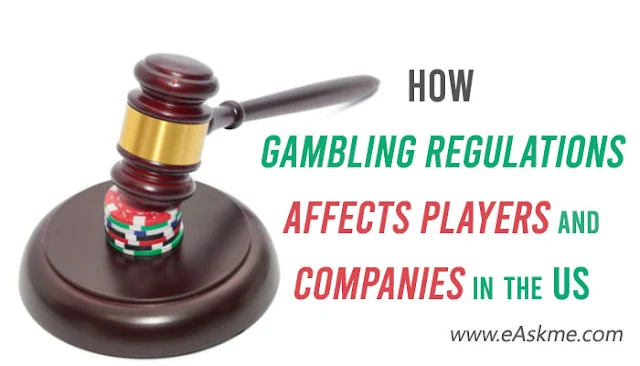For every country like the United Kingdom, with strict but mostly fair regulations, we have many more that are either too heavy-handed with their policies or tax the operators into oblivion.
 |
| How Gambling Regulations Affects Players and Companies in the US: eAskme |
Other people are reading: Guide To Use Social Media In Online Gaming
But while most governments set the rules and regulations for the entire country, there are those who leave things to be decided on the regional level.
The United States is one such country, with each of the 50 states coming up with its own specific set of laws.
All in all, it is a chaotic mess of legislation that few know about in its entirety and fewer still understand it all.
For example, this article about US sports betting goes into detail about the draconian measure imposed on certain gambling industries.
The Unlawful Internet Gambling Enforcement Act of 2006
Online gambling first started appearing on the radar during the mid to late 90s and it quickly gained traction worldwide.As with all new industries, it was the Wild West and most operators were left to do as they pleased.
Few if any regulations were introduced and it was interesting, to say the least.
But as it goes, all good things must come to end and this came with the introduction of the Unlawful Internet Gambling Enforcement Act in 2006.
With the passing of a single piece of legislation, the Federal Government killed the online gambling industry in the United States.
Not that what the operators were doing was particularly overseen or lawful but overnight almost all of them shut their virtual doors.
Playtech, one of the largest software providers in the online casino industry, lost 40% of its share value following the Act.
What the Act did was not to ban online gambling, it was already illegal on the state level in most states, but to ban the transactions from players in such states.
Without the needed cash flow, the industry ground to a halt.
Revival of Online Gambling in the United States
In recent years, the online gambling scene has been picking up steam but it is nothing compared to what it once was.Legal online gambling is available only in a few states, primarily, New Jersey, Pennsylvania, Nevada, and Delaware.
Others also permit some level of online betting but not to the same levels as the previous four.
However, a comprehensive study regarding the US gambling market reveals that it is not as cut and dry as it may seem.
For one, companies need to acquire a separate license to operate in each state. This is hardly intuitive and the red tape is a hindrance for the development of the scene.
Therefore, it is hardly surprising that operators choose to focus on only a single state rather than on all available markets.
Other entities in the online gambling industry are not really fond of doing business in the US.
Particularly, the US online casino scene features relatively few software providers as opposed to that of Europe.
Looking at licensed online casinos, you will likely find games from Reel Time Gaming and a few other smaller companies.
While the titles produced by these companies are not by any means bad, the lack of variety certainly hurts the industry.
For reference, there are tens of thousands of online casino games available globally and it does not make sense for the US market to only see a few hundred of them in a legal form.
The players’ end of things looks better but there are still some aspects that pose problems.
As we mentioned above, certain forms of gambling may be permitted in a state but not in a different one.
As a result, companies have to make sure that the customer is physically located in the state otherwise they risk breaking the law.
To ensure this, operators have to track a customer’s location at all times and if they step outside state borders, their access to the platform is removed.
This is surely an invasion of privacy that bettors in other countries are not subjected to but it is the only way to make the scene work in its current state.
What the Future Holds
As it currently stands, the United States’ online gambling industry is nowhere near as great as it could be.There is much potential for growth in this sector and it remains an untapped gold mine, held back only by the draconian laws of the states’ legislatures.
If US gambling law were to become more permissive, the country could well have the world’s most valuable online gambling scene.
If you still have any question, do share via comments.
If you find this article interesting, don’t forget to share it with your friends and family.
Sharing is Caring!
Don't forget to like us FB and join the eAskme newsletter to stay tuned with us.
You May Also Like These;










